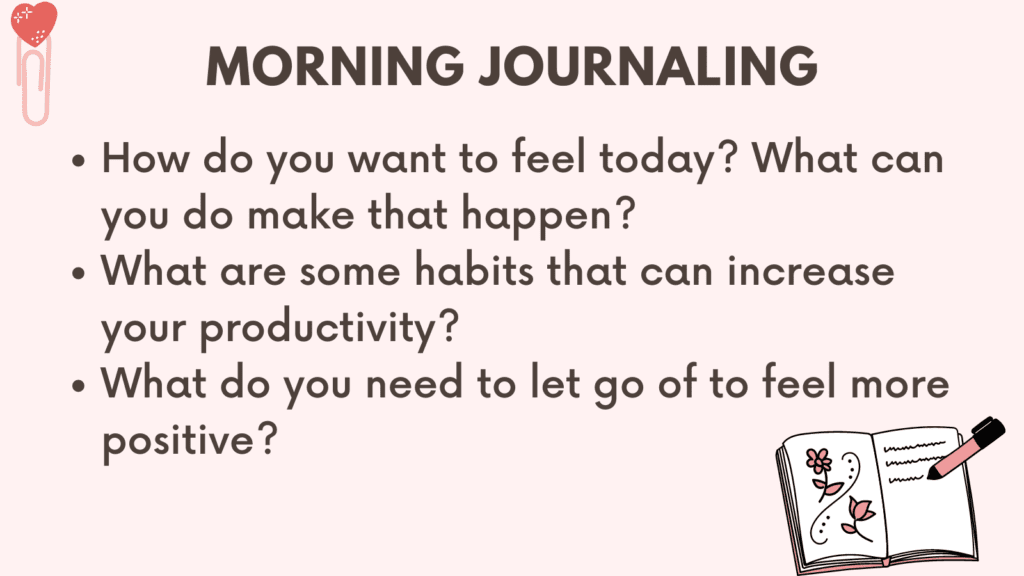This post contains some of the best journal prompts for perfectionists.
What Are Journal Prompts?
Journal prompts are questions, ideas or statements designed to inspire reflection and encourage writing in a personal journal.
They are tools to help individuals explore their thoughts, emotions, and experiences, and can be used as a starting point for self-discovery and self-reflection.
The goal of journal prompts is to provide a structure or framework for writing that can help individuals deepen their understanding of themselves and their lives.
What Is Perfectionism?
Perfectionism is a personality trait characterized by a person’s striving for flawlessness and setting high-performance standards, accompanied by critical self-evaluations and concerns about the quality of one’s work.
Perfectionists often have a constant desire to achieve excellence in everything they do, which can be both motivating and paralyzing.
They may experience anxiety or depression if they fail to meet their own high standards and may also struggle with accepting constructive criticism or mistakes.
While striving for excellence can be positive, a perfectionist’s pursuit of impossible standards can lead to negative consequences such as burnout, decreased productivity, and low self-esteem.
Benefits of Using Journal Prompts for Perfectionists?
Using journal prompts can be very beneficial for perfectionists. Here are some of the benefits:
1. Provides a structured way to explore feelings and emotions – Journal prompts can help perfectionists to delve into their thoughts and feelings in a more structured manner, allowing them to identify and process any negative emotions.
2. Encourages self-reflection – Writing out responses to journal prompts can encourage self-reflection, which can help perfectionists to identify their patterns of behavior and thought. This can lead to greater self-awareness and understanding.
3. Helps to develop a growth mindset – By using journal prompts, perfectionists can work on shifting their mindset from a fixed mindset to a growth mindset. This means that they can embrace challenges and view mistakes as opportunities for growth and learning.
4. Boosts self-esteem – Journaling can be a positive and affirming experience. By reflecting on their achievements, perfectionists can start to recognize their strengths and abilities, which can help to boost their self-esteem.
5. Provides a non-judgmental outlet – Journaling can be a safe space for perfectionists to express themselves without fear of judgment or criticism. This can be especially liberating for those who are used to feeling like they always have to be perfect and put together.
Overall, journal prompts can be a powerful tool for perfectionists looking to improve their mental health and wellbeing.
Journal Prompts For Perfectionists
1. Has perfectionism been a lifelong problem for you? At what age did you begin to notice that perfectionism was an issue? Has it worsened or improved over time?
2. Was there a time when your perfectionism was helpful to you? If so, how? What changed over time?
3. Are you aware of any early experiences that may have caused perfectionism (e.g. modeling of perfectionistic behaviors by caregivers, external pressure, criticism, reinforcement of perfectionistic behaviors, etc.)?
4. In what ways has your perfectionism been rewarded in your life?
Related: Top 20 Practical Ways to Overcome Toxic Perfectionism (& Get Things Done)
5. Is your perfectionism causing problems in your relationships with others (e.g., friendships, romantic relationship, parenting)?
6. What feelings do you tend to experience when your perfectionism is triggered? Anxiety? Fear? Inadequacy? Shame? Guilt?
7. How do you feel physically when perfectionism-related feelings hits (e.g. intense arousal symptoms such as racing heart, breathlessness, sweating, stomach ache, dizziness, etc.)?
Related: Am I A Perfectionist Quiz
8. What sorts of situations tend to trigger feelings of inadequacy, anxiety, or distress? In what areas of your life do you tend to be most perfectionistic? At home? At school? At work? What high standards do you have for yourself in each of those situations? Are you able to meet those standards? If so, at what cost?
9. Do your standards help you to achieve your goals or do they cause you to get less work done?
10. What would be the costs and the benefits of relaxing a particular standard or ignoring a rule that you have for yourself or others?
11. To what degree do you define your self-worth in terms of your attaining your goals?
12. What do you fear might happen if you made a mistake or other people noticed a mistake or imperfection? What would you tell a friend who has the same fear?
Related: Root Cause Of Perfectionism (top 5 Causes)
13. How can you remind yourself that you are enough just as you are?
14. If you feel anxious, how can you calm yourself?
15. What can you do to show yourself more acceptance and compassion?
16. What are your strengths?
17. What are you grateful for most?
18. What values do you want to live by? What is most important to you in life?
19. How can you enjoy the process more rather than focusing only on the outcome?
Related: Top 30 Affirmations For Perfectionism (+FREE Worksheets)
Perfectionism Worksheets
How to Use Journal Prompts for Perfectionists?
Here are some tips for incorporating journal prompts into your routine:
1. Start with a specific prompt: Choose a specific prompt that addresses a particular aspect of your perfectionism.
2. Be honest with yourself: It’s essential to be honest with yourself while writing in your journal. Don’t hold back. Write down everything that comes to your mind, no matter how difficult or uncomfortable it may be.
3. Focus on self-compassion: Try to shift your focus from achieving perfection to practicing self-compassion. Write about the ways in which you are kind to yourself and how you can show yourself more compassion.
4. Develop a routine: Set aside time each day or week for journaling. This will help you develop a habit of writing and provide you with an outlet to express your thoughts and emotions.
5. Reflect on your progress: After writing in your journal for some time, reflect on your progress. Notice how your mindset has shifted, and celebrate your successes.

Conclusion
Using journal prompts is a great way for perfectionists to work through their tendencies and develop self-compassion.
Remember, perfectionism is a challenging habit to break, but with consistent effort and self-compassion, you can learn to let go of unachievable standards and embrace imperfection.



